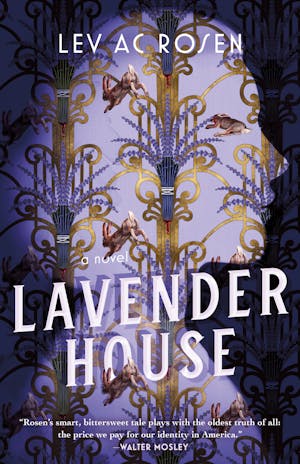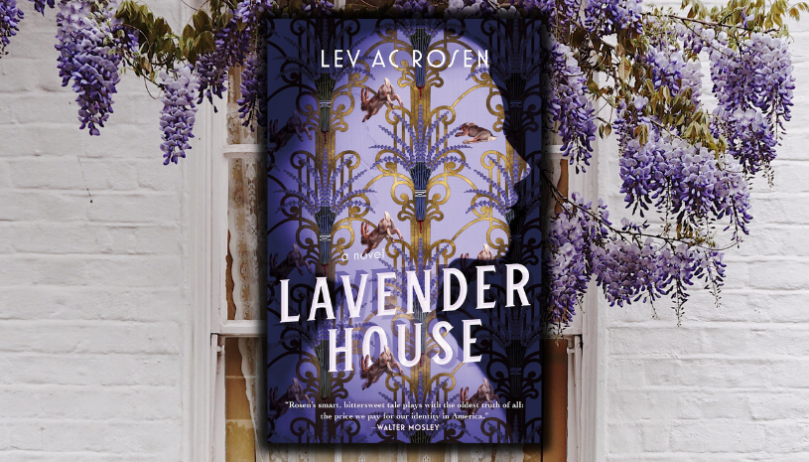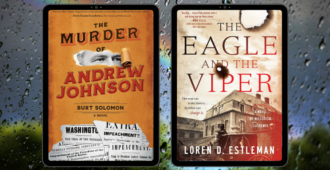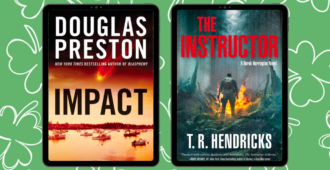 A delicious story from a new voice in suspense, Lev AC Rosen’s Lavender House is Knives Out with a queer historical twist.
A delicious story from a new voice in suspense, Lev AC Rosen’s Lavender House is Knives Out with a queer historical twist.
Lavender House, 1952: the family seat of recently deceased matriarch Irene Lamontaine, head of the famous Lamontaine soap empire. Irene’s recipes for her signature scents are a well guarded secret—but it’s not the only one behind these gates. This estate offers a unique freedom, where none of the residents or staff hide who they are. But to keep their secret, they’ve needed to keep others out. And now they’re worried they’re keeping a murderer in.
Irene’s widow hires Evander Mills to uncover the truth behind her mysterious death. Andy, recently fired from the San Francisco police after being caught in a raid on a gay bar, is happy to accept—his calendar is wide open. And his secret is the kind of secret the Lamontaines understand.
Andy had never imagined a world like Lavender House. He’s seduced by the safety and freedom found behind its gates, where a queer family lives honestly and openly. But that honesty doesn’t extend to everything, and he quickly finds himself a pawn in a family game of old money, subterfuge, and jealousy—and Irene’s death is only the beginning.
When your existence is a crime, everything you do is criminal, and the gates of Lavender House can’t lock out the real world forever. Running a soap empire can be a dirty business.
Lavender House will be available on October 18th, 2022. Please enjoy the following excerpt!
CHAPTER ONE
I thought I’d have the place all to myself, this early. Like church on a Tuesday— no one but you and God— or in my case, the bartender. But there’s a guy and girl, high school kids or maybe just twenty, sitting at one of the booths in the back. They’re trying to keep their voices low, but he’s failing, getting angry. Something about wiener dogs. It’s weird the things people fight over.
He pounds the table and she whimpers a little. I sigh, feel my body shifting to get up. I don’t have to do this anymore. Hell, no one even wants me to. That’s why I was fired. But some habits you can’t break. So I down what’s left of my martini, motion the bartender to pour another, and stand up and go to the back of the place, where he’s holding her wrist, tight. Her arm is stretching like a shoelace as she tries to stand up, but he won’t let go. On her other wrist, she’s wearing a charm bracelet. Just a few charms: An eagle, that’s a mascot for one of the local schools, with “1950” under it, so she graduated two years ago. A book, so she’s a reader. A wiener dog, for her pet, I’m guessing, and the source of the argument. And an apple. Teacher’s favorite, or she just really likes apples, maybe. Not enough life lived for many charms. Not enough to cover the bruise, either.
“I think the lady wants to go,” I tell him. I’ve had enough to drink that I sound like a two-bit tough guy. Maybe I am a two-bit tough guy.
“Mind your own business, pal,” he says. He talks like he’s seen too many mobster movies. Or maybe he’s just trying to match me.
“Miss, you want to leave?” I ask her, looking past him.
“Hey, hey, mister, don’t ignore me,” the kid says. I keep my eyes on the girl.
She nods, but doesn’t say anything, so I reach out and I pull back his finger from her wrist, hard. He yelps in pain but she gets loose and runs out of the bar, the little bell on the door jingling as it closes behind her.
“It’s too early for this, fellas,” the bartender says, the words coming out of him in one long sigh.
“I was just helping the lady,” I say, turning my back on the kid, walking back to the bar. I know he’s going to come up behind me, so I wait till I feel him, then spin and catch the fist as it connects with my shoulder. Not that hard. Just enough I wheeze a little, which makes him smile, like he’s won something. I don’t like that smile. Reminds me too much of the mirror. So I grab his wrist and yank his arm back.
“Hey, hey,” the kid says, “fuck you.”
He swings with his other fist, so I catch that one, too, and turn him around, holding his arms behind him.
“You can’t do this!” the kid says. He looks over at the bartender, who keeps his eyes on the glasses in front of him. The kid stares as I march him to the door and then turns his head around to look at me. “You’re drinking martinis? This early? That’s cool, man. I can buy you one. We can talk this out.”
I roll my eyes, kick the door open, and push him out of it, onto the ground. He goes face first, but I know he’ll just have a scrape. I’ve done this enough—before. Sometimes it makes me feel better, helping, like I’ve done some good in the world. Not today, though. Probably for the best. Might make me reconsider my plans.
He stares at me, the sun beating down on him and the concrete, like he’s waiting for me to say something.
“Don’t be rude to women,” I announce, loud enough someone across the street looks over. It’s the best I’ve got. I hiccup. Then I grin, ’cause I’m pretty drunk and I still managed to toss him out. And because I have another martini waiting for me.
“Screw you,” he says, getting back up, but it sounds weak and he knows it. I turn around and bounce off the glass door of the bar, which has closed behind me. There goes my heroic exit. The kid starts laughing, but I step back, rub my nose, and turn the handle, walking back in, the kid still cackling behind me.
I take my seat and drink the new martini in front of me in one swallow. The bartender looks at me like I’m the sorriest sight in San Francisco, and maybe he’s right, but I try not to let it show. I lift my chin and order another, keeping my voice even, proud. I’m proud to be in this bar at 2 p.m. on a Monday. I’m proud to have thrown some kid out on the street, even though it’s not my job anymore. Hell, I’m proud to be jobless, blacklisted. I’m proud to have just ordered my fifth drink. I’m probably not fooling anyone, but I can try. He mixes it for me turned away, and if he makes a face, I can’t see it. And with the kids gone, no one else is around to judge. I tap my fingers slowly on the bar. I’m patient. I have all day—that’s the plan: drink all day so when it’s dark, and no one will notice, I’ll be drunk enough to pitch myself into the bay.
I like the bay for it. It’s how Jan Westman was found. I remember looking at her on the shore of Stinson Beach, when we still thought it was just a case of a drunk falling into the bay. She looked peaceful. She hadn’t been in the water more than a night. Her skin was pale, a little blue, her eyes closed by the old man who found her and called in the local police, who called us after finding her ID. He’d folded her arms over her chest, too, and Lou said it was morbid, but I thought she looked relaxed, at ease with what had happened. I was actually surprised when her blood came back sober and we had to look at it as murder, and then when we caught the guy and found out what had been done to her. If a night in the water can wash away trauma, make a body like hers look serene, I think it can at least do it halfway for me.
When the door of the bar opens, it rattles me out of the memory, and I’m staring at my drink again, Patti Page singing “Tennessee Waltz” from the radio, her voice soft with static. I have the record of this one. I almost wonder what will happen to it, after, but then the martini slides that thought away.
I don’t even bother glancing up to see who’s come in until she sits down next to me. Her lips are painted bright red. She’s wearing a yellow skirt that cuts at the calf and a matching jacket decorated with a circular black-stoned brooch. Perched on her short, dark (surely dyed at her age) hair is a small hat with a small pin in it of an overlapping “WAC”—the Women’s Athletic Club. Her style is dated, but very high society. I’ve seen plenty of women like her, their money protecting them from the change they fear so badly, like a suit made of gold foil.
She lights her cigarette, perched in a holder, and asks the bartender for a Manhattan. She has a deep, sharp voice, and it cuts through the fog of drunkenness in my mind. She’s right out of a movie—she could ask me to kill her husband any second now. She swivels on the stool next to mine, and I have half a mind to tell her she’s barking up the wrong tree—why not? But when I look up, she’s not making eyes at me. Not like that, anyway. She looks at me like she feels sorry for me, a baby bird fallen from the nest. Well, screw her. I might be over, as far as lives go, but I’m nothing to feel sorry for. I’m doing this on my terms.
I smile at her, hoping she’ll stop looking at me like that. That works sometimes—I’m a good-looking guy and a smile makes people feel at ease. But since the day before yesterday my smiles haven’t fit right, and this one is no different. She’s not impressed by it. But I can tell that’s not my fault. She’s not impressed by much, this woman. So I turn away, prepared to ignore her outright. But then.
“Evander Mills?” she asks as the bartender puts her Manhattan down in front of her. She says it like it’s a question she already knows the answer to. I get the impression that’s the only kind she asks.
“How do you know my name?” I try not to let the alcohol slur my words.
She sips her drink, then takes the cherry out and sets it on the bar, staring at it like it owes her money and isn’t the one bit of sweetness in her drink.
“I know why you were fired from the police force,” she says, eyes still on the cherry.
And just like that, whatever traces of the martinis that were left in me vanish in a shiver of ice and the acrid smell of her cigarette smoke. I stand up, because otherwise I’d fall off my stool. I don’t look at her. I fumble in my coat for my wallet and take it out, ready to settle, but she rests a gloved hand on my arm and squeezes.
“Relax,” she says. “It’s a selling point with me.”
I stop fumbling and stare at her hand on my arm. She drops it, but lifts her chin and now she’s smiling at me. Her smile fits. It’s like the ones I get and give in the Black Cat sometimes. Not the smile that’s an invitation, but the one that says, “I know you, we’re safe here, we’re home.” Even if they never worked on me, not like they were supposed to, I know those smiles.
“Oh,” I say.
Her eyes are shot with strands of red, not the kind from exhaustion or reefer. The kind from crying for days. She’s wearing concealer, but nothing can hide eyes like that except sunglasses.
She glances at the bartender, who, having nothing else to do, is watching us, seeing how this will play out. Then she turns to me and takes a money clip out of the black purse she’s put on the bar and throws down enough cash for both of us.
“Let’s go sit over there,” she says, grabbing her drink and motioning with her chin at the booth farthest from the bar. I pick up my drink and follow her as she walks over, then sit down opposite her. The cheap leather squeaks under me. This is the same booth the kids were in. It still smells like the girl’s perfume, too sweet.
“I know you need work. I might have a job for you.” She says it softly, so the bartender can’t hear—that sort of job. The booth we’re in is in the corner and light from the big windows shines in, making me squint. It’s hard to read her with her back to the light like that.
“What kind?” I sip my drink.
“The kind like you used to do for the police. The inspector kind.” She takes a long drag of her cigarette. “You were good, right?”
“Yeah,” I say. My chest gets warm with pride or arrogance or alcohol, I’m not sure which, then it gets cold again real fast, when I remember that that part of my life is over. “But look, I don’t want people to think that I—” That I’m queer, I almost say. Though, of course, I am. And everyone knows it now. Or at least, everyone on the police force, which is enough.
“No one will think anything,” she says briskly. “No one will say anything. That’s the whole point of a private detective, isn’t it? Privacy. And besides, I’m not someone people would know in that sense.”
I sip again. I’ve never worked freelance before, but this could be good. This could be something worth hanging around for. Money. Go out with a bang—a few more nights at the Black Cat, or maybe even the Oak Room or the Ruby, fanning out cash and boys flocking around me before I’m back to waiting for sundown and a dark part of the bay to wash myself off the world. I suddenly realize I want that so bad I can taste it, smell it—lips, breath on my neck, tinged with whisky. One more night. A kiss goodbye.
A chance to help someone again, too. I don’t think about that part, though. I just open my mouth.
“All right, so what’s the case?”
She swirls the last of her drink in the glass. “What made you good at it? Being an inspector?”
“I like helping people.”
She raises an eyebrow. “That wouldn’t make you good at it.”
I smile, but I can feel it looks sad, so I take it off. “Crimes are about secrets,” I tell her. “And I have enough experience keeping secrets I’m very good at finding them.” I pause. A bitter laugh spits out of me. “At least, I thought I was.”
She nods. “How did you end up getting caught, then?” she asks. “If you were so good at it.”
I look down at the table. Formica winks back up. Lou was out sick. He usually told me what club they were hitting—not ’cause he knew about me, but because I asked every couple of weeks, and he thought it was just us chatting like partners do. “I had a system,” I tell her. “It was flawed.” Flawed ’cause I asked Jim instead, forgetting he was an idiot, trusting him not to get it wrong. Since the judge ruled that gay people could gather and be served, the bars weren’t illegal, not exactly. But if you found “immoral” goings-on, that was enough to shut them down. Immoral like kissing, like touching, like—“And I really wanted . . .” I stop. She reaches out and puts her hand over mine.
“I know,” she says. “We all make mistakes when we want something.”
“Still. I wish it had been a different kind of mistake.” I remember Jim kicking open the door to the bathroom, chuckling, saying loudly he needed to check it was clean. Making everyone feel uncomfortable—that was the goal. When the door opened I was on my knees, already trying to scramble up. We were paraded out in cuffs before we could zip up our flies. The bartender claiming he had no idea, the female impersonator on stage sighing loudly, the other patrons shooting us looks—pity, anger, amusement. The bar got fined, but not shut down, at least.
“Did you tell everyone else?” she asks.
I feel a cold drop of ice in my blood. “About what?” I look back up at her.
“The police, when they were coming. Your system. Did you warn people?”
I wait too long, long enough it may as well be an answer, so I move on. “You said you had a case?” I ask her.
She pulls her hand away. There’s a moment where we look at each other, so quiet we can hear each other breathing. I know what she’s thinking, but I don’t answer the question she doesn’t ask: Why not? Because the answers are selfish, arrogant: I was too worried about myself to think of anyone else. Their own fault for not looking out for themselves. Other queers aren’t my responsibility anyway. I wouldn’t tell her the truth: that we’re all alone in this world, and it never occurred to me to pretend like we weren’t.
“Murder,” she says suddenly, in the same hard tone she used to order her drink, which she now lifts and finishes in one swallow. “You’ve solved those before, right?”
“Sure,” I say. “Plenty. This is someone close to you? The one you’ve been crying over?”
She frowns and touches at the corner of her eye with her thumb, pulling at the skin a little. “I thought I’d hid it,” she says.
I shake my head. “Sorry for your loss.”
“Thank you. It was my . . .” She glances up again, looks behind me. I turn to see—the bartender is still watching us. “Maybe we should drive. You’re interested in the job?”
“Yeah,” I say, licking the inside of my mouth. “Interested. But I don’t even know your name.”
She smiles, and then throws back her head in a loud laugh. “I haven’t said it, have I?” She extends her hand. “I’m Pearl Velez.”
Her grip is as hard as her voice. She smirks as we shake.
“And you were about to say—the victim?”
“Irene . . .” she says. Then glances at the bartender again.
She stands up, tossing her cigarette into the glass. “But let’s talk more about that on the way.”
I down what’s left of my drink and follow her outside to where one of those new Packard Mayfair convertibles is waiting. It’s dark red with black leather interior and the top is down. She opens her door and slips in and when I stare, she reaches over and pops open the passenger door for me. I get in and before I even close the door, she’s burning rubber, reaching into the glove compartment for a pair of sunglasses with her eyes still on the road. The radio is already on, Rosemary Clooney singing “Mixed Emotions.” Pearl drives fast, confident, wild. She swerves around anyone obeying the speed limit and throttles the gears to climb over the hills, heading west, zipping over the Golden Gate Bridge. Some mist still lingers over the water, but the sun is bright enough I squint and slump in my seat, holding on to the door handle so I don’t fly away. Once we’re over the bridge, she really lets it out, moving so fast I can feel the wind pressing itself into my mouth and nose, like water blasting through my brain to clean the drunkenness out.
“So where are we going, Pearl?” I have to shout to be heard over the wind in our faces.
“We’re going to our home. Irene’s home. Her full name was Irene Lamontaine, and she was my wife.”
The wind is loud, so for a moment I think I didn’t hear her right.
“Your what?” I ask.
She smiles without looking at me, and I can’t quite read her expression behind the sunglasses, but I think it’s amused, like this is the sort of thing she has to repeat a lot. “My wife.”
I lean back. Even in the clubs and bars, no woman calls another woman her wife, at least not as loudly as Pearl is. They whisper it, or say it as a joke, or defensively, trying to start a fight. No one says it like Pearl just did, like it’s the most normal thing in the world.
“Come on, Mr. Mills,” she says, still smiling. “Surely my loving a woman isn’t enough to shock you.”
“Only that you’d say it out loud like that.” I try to keep my voice casual.
“Where we’re going, we say everything out loud,” she responds, her voice a growl imitating the engine.
“Then why do you need me?” I ask.
She doesn’t answer—I’m not sure if she heard me. The wind pulls through her hair, makes it flutter, and she speeds the car up just a bit. Around us, San Francisco has faded away into a stretch of the 101. The water is to our right, past some open fields. The light is cold and yellow.
“So everyone there . . . ?” I let the question hang.
“Yes,” she says. “We’re all queer. It’s why we don’t want the police around.”
I lean back in the seat. Sure, I’ve been around queers in groups before. The Black Cat, the Beige Room, Mona’s, plenty of places in the city, and I’ve been to most of them. But those are for the night. Those are for lingering looks and meetings in the bathroom, dancing sometimes, flirting, and always looking out for the cops, for a blackmailer, for something that would force you back out onto the street, into the real world, where no one would look at you the same if they knew. You’d be unemployable, except at some low-wage bar gig back in one of those clubs. Friendless, aside from the others like you. A whole other life you didn’t choose—or the other option. My option, before Pearl sat down next to me.
But shacking up? Friends? Family? We don’t get to do that, unless we’re very careful, or have nothing left in the real world, are already cast out. Not someone like Pearl.
“You’re smiling,” she says. I realize she’s right. “Why?”
“I guess, it’s just, two days ago, I would have told you to turn the car around.”
“And now?” she asks.
Now . . .” I laugh. None of the guys I’d worked with for the past ten years, guys I’d called friends, who I thought would have taken a bullet for me— none of them would even look at me as they led me from lockup to the chief’s office. Even he wouldn’t meet my eye as he told me I was done. Conduct unbecoming, perversion, lewd acts. They said they wouldn’t lock me up, though. That was their one token for my years of service. They’d just let everyone know what I was and what they’d found me doing and my life in the real world would be over.
“Now,” I say, “what do I have to lose?”
Click below to pre-order your copy of Lavender House, coming October 18th, 2022!













Comments are closed.
Leave a Reply